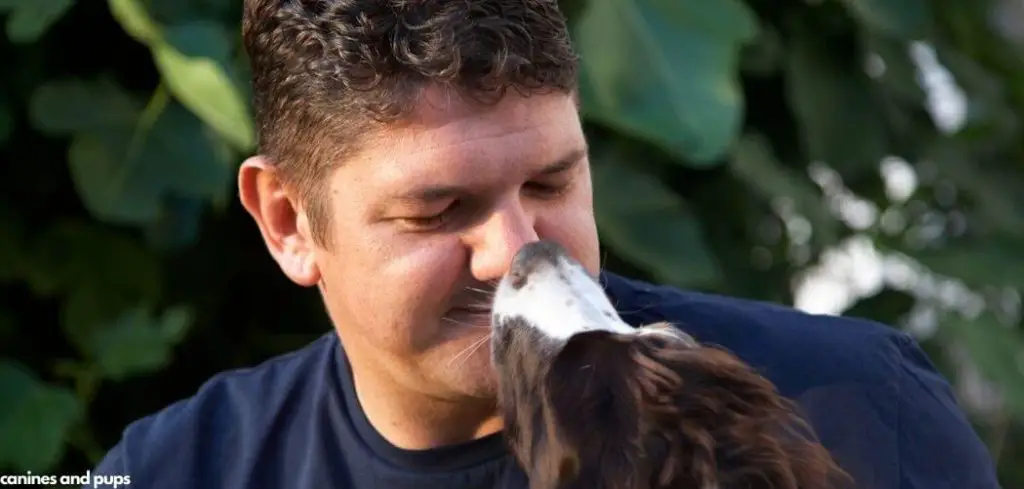When an old dog begins excessively licking their owner, it can feel sweet at first, but over time, it may raise concern. This behavior can be from affection to stress or even a medical problem that requires attention.
We outline the common reasons why your old dog excessively licks you, what you can do, and when to seek veterinary help.
Old Dog Excessively Licking Me — Why It Happens
Your old dog excessively licking you is often a combination of behavioral, emotional, and health-related causes. Older dogs may lick out of habit, anxiety, cognitive decline, dental issues, nausea, or skin irritations. Sometimes, it’s simply an affectionate gesture, but when it becomes obsessive, it may point to something more serious.

Old Dog Excessively Licking Me: Common Causes
Cognitive Dysfunction (Canine Dementia)
As dogs age, they may develop cognitive dysfunction, similar to dementia in humans. This condition can lead to repetitive and unusual behaviors, including excessive licking.
Owners may notice confusion, disrupted sleep, or pacing in addition to constant licking. The behavior may provide the dog a sense of comfort but also indicate their brain is struggling with age-related changes.
Read more: Dog Excessively Licking Me Before Bed (Here’s why)
Anxiety and Stress
Older dogs can experience heightened anxiety, especially if they can’t see, hear, or move as easily as before. Licking is a self-soothing behavior, and some dogs redirect it to their owners.
You might notice this happens more at night, during storms, or when routines change. Over time, anxious licking may become excessive and exhausting for both the dog and their owner.
Dental Disease and Oral Pain
Dental disease is very common in senior dogs and can cause pain, inflammation, and discomfort. Excessive licking of their owner may be a way for the dog to relieve oral irritation or distract themselves from discomfort.
Other signs to watch for include drooling, pawing at the mouth, bad breath, or reluctance to eat. Since dental disease can be serious, persistent licking combined with oral signs warrants a veterinary exam.
Nausea or Gastrointestinal Issues
When a dog feels nauseous, licking is one of the first behaviors that appears. An old dog may lick themselves, furniture, or their owner’s skin in an effort to cope with the sensation.
Causes of nausea can include pancreatitis, liver disease, kidney problems, or dietary changes. If licking is paired with vomiting, drooling, or appetite loss, gastrointestinal issues should be suspected.
Skin Allergies or Irritations
Skin conditions and allergies are common in senior dogs, and discomfort can cause them to lick excessively. If licking is directed toward their owner, it may be a redirected behavior due to itchiness or irritation elsewhere on the body.
Look for signs like redness, hair loss, or hotspots on their skin. Allergies often worsen with age and may require veterinary management.
Affection and Habit
Sometimes, old dogs lick excessively simply because it’s an ingrained habit or a way of showing affection.
Dogs learn from a lifetime of being rewarded with petting, cuddles, or attention when they lick. In old age, the behavior can intensify as they become more dependent on their owner.
While harmless in some cases, it’s important to distinguish affectionate licking from behavior linked to medical concerns.
What to Do If Your Dog Is Old Dog Excessively Licking You
At home, you can start by gently redirecting the behavior with toys, chew items, or calming activities like slow walks. Providing mental stimulation, such as puzzle feeders, can also help reduce obsessive licking.
If stress or anxiety seems to be the trigger, maintaining a predictable routine and creating a calming environment may help. Soft music, pheromone diffusers, or calming supplements (with veterinary guidance) can also support an anxious senior dog.
For dental concerns, offering dental chews or brushing your dog’s teeth may help temporarily, but veterinary cleaning may be necessary.
If nausea is suspected, feeding smaller, bland meals and monitoring closely may provide short-term relief, but this should not replace veterinary care if the problem persists.
When to Call or Visit Your Vet
Seek veterinary attention if licking is paired with additional symptoms such as vomiting, diarrhea, drooling, coughing, or appetite loss. These could signal underlying conditions that need treatment.
If your dog has foul-smelling breath, bleeding gums, or is reluctant to eat, dental disease is likely and requires professional cleaning or treatment.
Signs of cognitive dysfunction, like confusion, pacing, or changes in sleep, also warrant a discussion with your vet. Medications and supplements can sometimes ease symptoms.
Persistent licking that interrupts your dog’s rest or your own comfort should not be ignored, as it may reflect pain, discomfort, or illness.
Read more: Old Dog Breathing Heavy and Not Eating (Here’s why it matters)
Key Takeaway
Excessive licking in old dogs can be affectionate but may also point to medical or emotional issues. From dental pain to anxiety or nausea, this behavior deserves attention—especially when it becomes repetitive or disruptive.
If your senior dog is excessively licking you, monitor for other symptoms, try gentle redirection, and seek veterinary help when needed. With the right care, you can help your old dog stay comfortable and supported in their later years.
